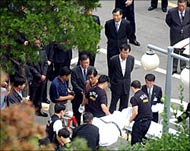Top Korean businessman commits suicide
A top executive of South Korea’s Hyundai conglomerate who was embroiled in a scandal involving secret payments to North Korea, committed suicide on Monday according to police and company officials.

Chung Mong-hun jumped from his 12th-story office in the Hyundai headquarters building in central Seoul.
Chung’s body was first found on the ground by his secretary and reported to police at around 0550 local time, said Park, a police officer at Seoul’s Chongno police station near the Hyundai headquarters.
Park said preliminary investigations showed that Chung appeared to have jumped four or five hours before his body was found.
Chung was on trial on charges stemming from allegations that his company helped former president Kim Dae-jung’s government secretly pay North Korea $100 million to get Pyongyang to agree to the summit between the Koreas.
In June, Chung was indicted on charges of doctoring company books to hide the money transfers. If convicted, he could have faced up to three years in prison.
So far eight former government and Hyundai officials have been indicted in the case.
Chung was a son of Chung Ju-young, the late founder of Hyundai, and had been leading Hyundai-Asan, a Hyundai subsidiary that runs a series of joint ventures with communist North Korea.
 |
|
Hyundai Asan Co. Chairman |
Independent inquiry
An independent counsel appointed by President Roh Moo-hyun to investigate the scandal announced in June that Hyundai-Asan had sent $500 million to North Korea, but said only $400 million was a company investment.
The rest was raised and sent by Hyundai on behalf of the government, the counsell said.
All of the money was sent to Pyongyang through Hyundai-Asan shortly before the June 2000 summit, former president Kim’s crowning achievement, which helped him win the 2000 Nobel Peace Prize, the investigator said.
Independent counsel Song Doo-hwan did not characterise the cash transfer as a pay-off for the summit, but he said the government “aide” for North Korea was related to the meeting and had been sent secretly through improper channels.
Hyundai says it gave the money to the North to secure business rights there covering tourism, railways and an industrial park.
Song’s findings threaten the legacy of Kim, who was hailed worldwide as a champion of peace for a reconciliation policy that laid the groundwork for the summit with North Korean leader Kim Jong Il.
Tensions eased after the meeting, but have spiked again over North Korea’s suspected nuclear weapons programmes.
Song had agreed not to consider whether the former president himself was culpable. However, three of Kim’s former top aides have been arrested and indicted on malfeasance and other charges.
The mammoth Hyundai, which used to be South Korea’s largest conglomerate, was split into three subgroups in the aftermath of the 1997-98 Asian financial crisis.
One controlled by Hyundai Motor, South Korea’s No. 1 carmaker; the second led by Hyundai Heavy Industries, the world’s largest shipbuilding company; and the third comprising the remainder of the former conglomerate and under the stewardship of Chung Mong-hun.